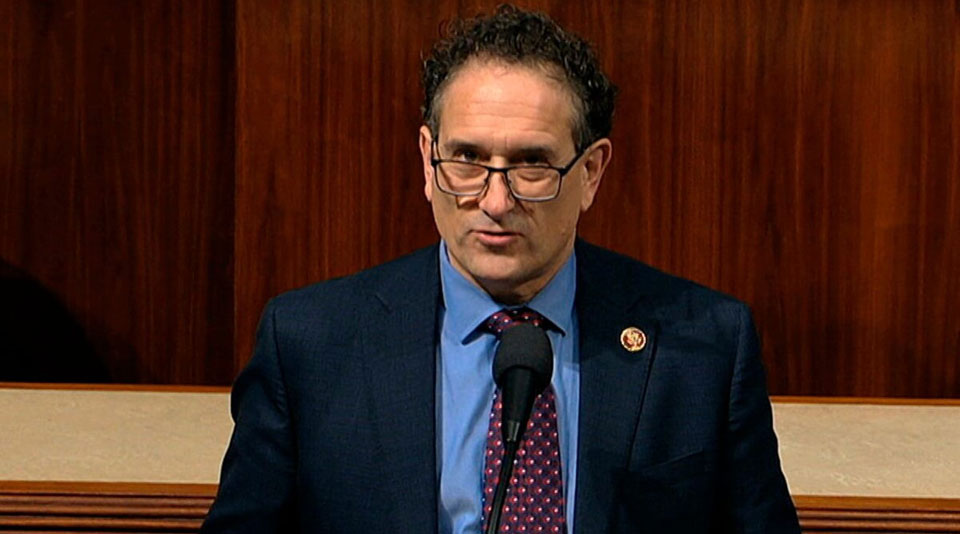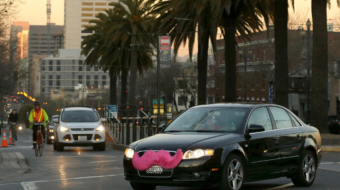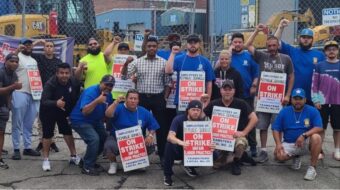
WASHINGTON—“Hit ‘em in the wallet,” hard.
That, in so many words, is the message the Democratic majority on the House Education and Labor Committee sent on Sept. 9-10 in its part of the Democrats’ $3.5 trillion tax and program package which lawmakers will vote on in mid-September.
“We passed penalties for firms that break the law on wage theft, on safety and health and when” firms prevent workers who “try to bargain collectively,” said Rep. Andy Levin, D-Mich., a former top union organizer and Deputy AFL-CIO Organizing Director.
“I do not expect or want to see these provisions eliminated or see them watered down,” he told a zoom press conference on the legislation on Sept. 13. “They raise revenue, but they’re also provisions to fight wealth and income inequality.”
Education and Labor’s fines against firms that harm their workers aren’t the only ones in the legislative package lawmakers will tackle. Indeed, they aren’t even the main ones. The tax-writing House Ways and Means Committee considered, also on party lines, to raise corporate tax rates and individual rates on high earners, too.
The tax provisions that the panel’s chair, Richard Neal, D-Mass., unveiled on Sept. 13 would raise the corporate tax rate from its current 21% to a new 26.5% rate, raise the top capital gains rate from its current 20% to a new 25% and raise the top individual tax rate from 37% percent to 39.6%, plus a 3% surtax on individuals’ income above $5 million.
It’s not enough, though, for the Institute for Policy Studies.
Ways and Means “moves the ball forward but doesn’t meet the scale of the moment,” IPS’s Chuck Collins and Rebekah Entralgo e-mailed. “The House tax reforms would raise an estimated $2.2 trillion, just barely more than the revenue lost to the 2017 Republican tax cuts. Under this initial House plan, the rich would pay a higher rate on ordinary income, but billionaires like Jeff Bezos who make most of their money off investments wouldn’t owe the IRS much more.
“In the coming weeks, let’s all keep pushing for the transformational budget deal the nation needs. And don’t forget to check Inequality.org and our social media feeds for regular updates.”
The package, now being assembled on Capitol Hill, envisions the societal overhaul Democratic President Joe Biden proposed in his Build Back Better Agenda. Besides the fines, it has many positive aspects.
Just the two committees’ sections include $707 million more for OSHA, nationwide paid family and medical leave, free universal pre-K, and two years of free community college tuition, for starters.
The Education and Labor section also features increased spending to rehab and upgrade crumbling schools, $450 billion for child care centers—and for center workers’ pay—and capping any family’s annual spending for child care at 7% of its income. Ways and Means’ section also includes measures to combat climate change and expanding Medicare to cover dental, vision, and hearing treatment, and extending the larger child care tax credit to at least 2025. That’s cut child poverty in half.
Tax hikes to pay for reconciliation
“The high cost of child care is straining family’s budgets and pushing millions of Americans out of the workforce,” said Rep. Bobby Scott, D-Va., the Education and Labor Committee Chair. “A majority of those are women. Lack of affordable child care is also hurting our economy, as employers are struggling to fill job openings to meet demand and grow their businesses.”
And the climate change language responds to “an existential threat,” said Rep. Mondaire Jones, D-N.Y., a first-year lawmaker, former New York City school principal, and a School Administrators (AFSA) member, told the zoom press session.
All the tax hikes, though, including the labor law-breaking fines, are to meet the requirement of the $3.5 trillion “reconciliation” resolution lawmakers passed in August that its programs be paid for. Reconciliation is supposed to deal only with taxes and spending limits. And that was the Education and Labor Committee’s dilemma.
It wanted to include the entire Protect The Right To Organize (PRO) Act in the legislation, thus enshrining the most wide-ranging pro-worker rewrite of federal labor law since the original National Labor Relations Act of 1935. But under reconciliation rules, it couldn’t achieve that goal.
So, for instance, the PRO Act’s language banning captive audience meetings can’t go in. But fining firms—and bosses, from CEOs down to line managers, plus board members—who call the meetings can. A fine of $50,000 per meeting, or $100,000 per meeting for repeat offenders would be kosher, as it would be for all unfair labor practices. That includes when the bosses illegally fire workers.
Those fines would cover both present labor law-breaking—such as illegal threats to close the plant—and new ones, such as captive audience meetings and hiring “permanent replacements” for economic strikers.
Current labor law-breaking penalties are net back pay for harmed workers and forcing bosses to post “we broke the law we won’t do it again” notices in workplaces. Neither deters corporate chieftains. The new fines also cover a lot more corporate wrongdoing against workers:
- Right now, captive audience meetings, where the boss or his hired gun union busters can harangue workers and workers can’t talk back, are legal. Now, the employer could still hold them–and pay fines.
- Right now, hiring permanent replacements for economic strikers is legal, and has been since a 1938 Supreme Court decision. Now the boss would be fined. So could the company’s CEO and board members.
“If the (National Labor Relations) Board determines, based on the particular facts and circumstances presented, that a director or officer’s personal liability is warranted, a civil penalty for a violation…may also be assessed against any director or officer of the employer who directed or committed the violation, had established a policy that led to such a violation, or had actual or constructive knowledge of and the authority to prevent the violation and failed to do so,” the bill adds.
- Right now, the boss can refuse to take a striking worker back when she unconditionally offers to return to work. That’s illegal, but the penalty is just net back pay and a return-to-work order.
Under the bill, it stays illegal, but it’s subject to the $50,000 or $100,000 fines, and not just against the firm, but against bosses, board members, and CEOs. And those honchos would be subject to fines if they authorized or condoned any other labor law-breaking, too.
- Right now pre-strike employer lockouts are legal. Under the bill, firms and CEOs that pull that stunt would face those same fines.
- Right now, the boss can intentionally lie to workers and tell them they’re “independent contractors,” not protected by the NLRA, workers comp, unemployment benefits, and not eligible for Medicare and Social Security unless they pay the payroll taxes themselves. The bill says such intentional boss lies and misclassification would draw fines.
- A recent Supreme Court ruling, on the usual partisan lines, says firms can force workers to sign compulsory arbitration of disputes, without the right to sue, and that arbitration trumps labor law. The bill overrides that, by saying such force would produce fines against the firms, per offense.
- Right now, a boss can force workers to attend political rallies, as Shell did when it ordered workers in Beaver County, Pa., to attend an August 2019 Donald Trump harangue or get docked.
If Shell tries that again, it’ll get hit with a fine. The only question, Harvard’s OnLabor blog pointed out, is whether the fine will be $50,000 per worker forced to attend (or per worker whose rights are violated in any way) or whether the $50,000 fine covers just the attend-the-rally order.
Courts will be able to throw out the fines, impose them or modify them, the legislation concedes. But it also bans judges from issuing temporary restraining orders “or any type of injunctive relief” on behalf of law-breakers subject to the fines.
With these fines, employers would have to think twice. Not only are fines set at $50,000 or $100,000 (for repeat offenders) per offense, but the bill says bigger firms could get hit with even bigger fines, the panel decided.
That’s up to the NLRB, which can consider “business size, public interest, and the gravity and past frequency of the offenses.” The fines raise money, after all.
And the panel Democrats hit firms engaging in wage theft, denial of overtime pay, and ignoring worker safety and health with high fines, too. Some of those fines are even higher than the ones for labor law-breaking:
- OSHA fines rise from $5,000, $7,000, or $70,000 per violation, depending on whether it was first-time, willful, serious, or fatal, to 10 times those sums.
- Fair Labor Standards Act fines–for such offenses as wage theft and denying overtime pay—escalate almost as much. They’re now $1,100, $11,000, and $50,000, again depending on the gravity and frequency of the offense. They’d go to $11,620 and $20,740—replacing the two $1,100 fines–$132,270 and $601,150. And fines for law-breaking against migrant and seasonal farm workers would increase from $1,000 per offense to $25,790.
Needless to say, the committee’s Republicans opposed everything. They tried to knock out the fines, the levies against the corporate honchos, and the OSHA money. Extreme right-wing Rep. Madison Cawthorn, R-N.C., went after OSHA, while Rep. Rick Allen, R-Ga., tried to kill all the PRO Act labor law-breaking language. Both lost on party-line votes. So did all other GOP amendments.
“This bill is about power and control. It is about solidifying union bosses’ stranglehold on workers,” yowled Rep. Virginia Foxx, R-N.C., the panel’s top Republican and former chair. In local media, she’s questioned whether unions should be legal. The entire GOP is expected to oppose the combined final bill.










